农业转基因生物安全管理条例
农业转基因生物安全管理条例-中华人民共和国农业农村部
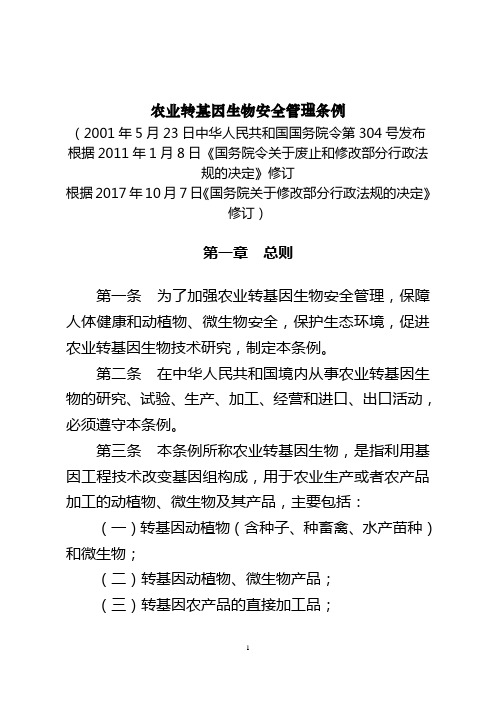
农业转基因生物安全管理条例(2001年5月23日中华人民共和国国务院令第304号发布根据2011年1月8日《国务院令关于废止和修改部分行政法规的决定》修订根据2017年10月7日《国务院关于修改部分行政法规的决定》修订)第一章总则第一条为了加强农业转基因生物安全管理,保障人体健康和动植物、微生物安全,保护生态环境,促进农业转基因生物技术研究,制定本条例。
第二条在中华人民共和国境内从事农业转基因生物的研究、试验、生产、加工、经营和进口、出口活动,必须遵守本条例。
第三条本条例所称农业转基因生物,是指利用基因工程技术改变基因组构成,用于农业生产或者农产品加工的动植物、微生物及其产品,主要包括:(一)转基因动植物(含种子、种畜禽、水产苗种)和微生物;(二)转基因动植物、微生物产品;(三)转基因农产品的直接加工品;(四)含有转基因动植物、微生物或者其产品成分的种子、种畜禽、水产苗种、农药、兽药、肥料和添加剂等产品。
本条例所称农业转基因生物安全,是指防范农业转基因生物对人类、动植物、微生物和生态环境构成的危险或者潜在风险。
第四条国务院农业行政主管部门负责全国农业转基因生物安全的监督管理工作。
县级以上地方各级人民政府农业行政主管部门负责本行政区域内的农业转基因生物安全的监督管理工作。
县级以上各级人民政府有关部门依照《中华人民共和国食品安全法》的有关规定,负责转基因食品安全的监督管理工作。
第五条国务院建立农业转基因生物安全管理部际联席会议制度。
农业转基因生物安全管理部际联席会议由农业、科技、环境保护、卫生、外经贸、检验检疫等有关部门的负责人组成,负责研究、协调农业转基因生物安全管理工作中的重大问题。
第六条国家对农业转基因生物安全实行分级管理评价制度。
农业转基因生物按照其对人类、动植物、微生物和生态环境的危险程度,分为Ⅰ、Ⅱ、Ⅲ、Ⅳ四个等级。
具体划分标准由国务院农业行政主管部门制定。
第七条国家建立农业转基因生物安全评价制度。
转基因生物安全管理制度
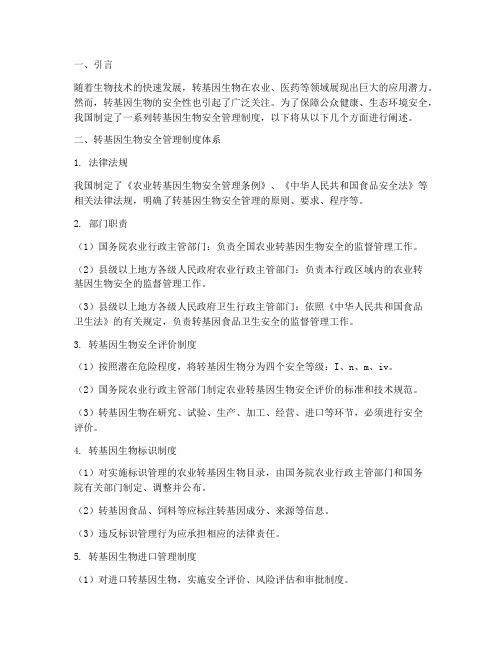
一、引言随着生物技术的快速发展,转基因生物在农业、医药等领域展现出巨大的应用潜力。
然而,转基因生物的安全性也引起了广泛关注。
为了保障公众健康、生态环境安全,我国制定了一系列转基因生物安全管理制度,以下将从以下几个方面进行阐述。
二、转基因生物安全管理制度体系1. 法律法规我国制定了《农业转基因生物安全管理条例》、《中华人民共和国食品安全法》等相关法律法规,明确了转基因生物安全管理的原则、要求、程序等。
2. 部门职责(1)国务院农业行政主管部门:负责全国农业转基因生物安全的监督管理工作。
(2)县级以上地方各级人民政府农业行政主管部门:负责本行政区域内的农业转基因生物安全的监督管理工作。
(3)县级以上地方各级人民政府卫生行政主管部门:依照《中华人民共和国食品卫生法》的有关规定,负责转基因食品卫生安全的监督管理工作。
3. 转基因生物安全评价制度(1)按照潜在危险程度,将转基因生物分为四个安全等级:I、n、m、iv。
(2)国务院农业行政主管部门制定农业转基因生物安全评价的标准和技术规范。
(3)转基因生物在研究、试验、生产、加工、经营、进口等环节,必须进行安全评价。
4. 转基因生物标识制度(1)对实施标识管理的农业转基因生物目录,由国务院农业行政主管部门和国务院有关部门制定、调整并公布。
(2)转基因食品、饲料等应标注转基因成分、来源等信息。
(3)违反标识管理行为应承担相应的法律责任。
5. 转基因生物进口管理制度(1)对进口转基因生物,实施安全评价、风险评估和审批制度。
(2)进口转基因生物必须符合我国转基因生物安全标准。
6. 转基因生物加工审批制度(1)对转基因生物加工企业,实施生产许可制度。
(2)加工企业必须符合相关安全标准和操作规程。
三、转基因生物安全管理制度实施与监管1. 加强宣传教育,提高公众对转基因生物安全的认知。
2. 强化监管,加大对违规行为的查处力度。
3. 完善技术检测体系,提高检测能力。
4. 加强国际合作,借鉴国际先进经验。
农业转基因生物安全管理条例English

Regulations on Administration of Agricultural Genetically ModifiedOrganisms SafetyFull textChapter I General ProvisionsArticle 1 These Regulations are formulated for the purposes of strengthening the administration of agricultural genetically modified organisms safety, safeguarding the health of human bodies and the safety of animals, plants and microorganisms, protecting the ecological environment, and promoting the research into technologies of agricultural genetically modified organisms.Article 2 The activities of research, experiment, production, processing, marketing, import and export with respect to agricultural genetically modified organisms within the territory of the People's Republic of China must conform to these Regulations.Article 3 Agricultural genetically modified organism, as referred to in these Regulations, means animals, plants, microorganisms and their products whose genomic structures have been modified by genetic engineering technologies for the use in agricultural production or processing, which mainly include:(1) genetically modified animals, plants (including plant seeds, breeding livestock and poultry,aquatic fry and seeds) and microorganisms;(2) products of genetically modified animals, plants and microorganisms;(3) products directly processed from genetically modified agricultural products;(4) seeds, breeding livestock and poultry, aquatic fry and seeds, pesticides, veterinary drugs,fertilizers, additives and other products containing ingredients of genetically modified animals, plants and microorganisms or their products.Agricultural genetically modified organisms safety, as referred to in these Regulations, means the protection of human being, animals, plants and microorganisms and the ecological environment against the danger or potential risk arising from agricultural genetically modified organisms.Article 4 The competent agricultural administrative department of the State Council is responsible for the nationwide supervision and administration of agricultural genetically modified organisms safety. The competent agricultural administrative departments of local people's governments at or above the county level are responsible for the supervision and administration of agricultural genetically modified organisms safety within their respective administrative areas. The competent public health administrative departments of local people's governments at or above the county level are, in accordance with the relevant provisions of the Food Hygiene Law of the People's Republic of China, responsible for the supervision and administration of the hygiene and safety of genetically modified food within their respective administrative areas.Article 5 The State Council establishes a system of inter-ministerial joint conference for administration ofagricultural genetically modified organisms safety. The inter-ministerial joint conference for administration of agricultural genetically modified organisms safety shall be composed of responsible persons from the departments of agriculture, science and technology, environmental protection, public health, foreign trade and economic cooperation, inspection and quarantine, and from other relevant departments as well, and shall be responsible for the discussion and coordination of major issues involved in the administration of agricultural genetically modified organisms safety.Article 6 The State institutes a class-based administration and evaluation system for agricultural genetically modified organisms safety. Agricultural genetically modified organisms are classified into Classes I, II, III and IV according to the extent of their risks to human beings, animals, plants, microorganisms and the ecological environment. The specific standards for the classification are to be formulated by the competent agricultural administrative department of the State Council.Article 7 The State establishes a safety evaluation system for agricultural genetically modified organisms. The standards and technical norms for safety evaluation of agricultural genetically modified organisms are to be formulated by the competent agricultural administrative department of the State Council.Article 8 The State institutes a labeling system for agricultural genetically modified organisms. The catalogue of agricultural genetically modified organisms subject to labeling administration shall be determined, adjusted and published by the competent agricultural administrative department of the State Council in consultation with the other relevant departments of the State Council.Chapter II Research and TestingArticle 9 The competent agricultural administrative department of the State Council shall strengthen the safety evaluation administration of research into and testing of agricultural genetically modified organisms, and set up a bio-safety committee on agricultural genetically modified organisms responsible for safety evaluation of agricultural genetically modified organisms. The bio-safety committee on agricultural genetically modified organisms shall be composed of the experts who are engaged in biological research, production, processing, inspection and quarantine with respect to agricultural genetically modified organisms, as well as those in the fields of public health and environmental protection, etc.Article 10 Based on the needs of the safety evaluation of agricultural genetically modified organisms, the competent agricultural administrative department of the State Council may entrust the inspection of agricultural genetically modified organisms to technical inspection bodies with necessary inspecting facilities and capability.Article 11 Units engaged in research into and testing of agricultural genetically modified organisms shall have facilities and measures commensurate with the safety class so as to ensure the safety of research into and testing of agricultural genetically modified organisms, and shall establish bio-safety groups of agricultural genetically modified organisms which shall be responsible for the safety of the research into and testing of agricultural genetically modified organisms in the units concerned.Article 12 A unit conducting research into agricultural genetically modified organisms classified asClasses III and IV shall make a report to the competent agricultural administrative department of the State Council prior to the commencement of the research.Article 13 The testing of agricultural genetically modified organisms shall normally go through three stages, i.e. restricted field testing, enlarged field testing and productive testing. Restricted field testing means a small-scale test conducted within a controlled system or under controlled conditions. Enlarged field testing means a medium-scale test conducted under natural conditions with appropriate safety measures. Productive testing means a large-scale test prior to production and application.Article 14 Where a testing of agricultural genetically modified organisms needs to move on to the stage of restricted field testing after completion of research in the laboratory, the testing unit shall make a report to the competent agricultural administrative department of the State Council.Article 15 Where a testing of agricultural genetically modified organisms needs to move on from one testing stage to the next one, the testing unit shall make an application to the competent agricultural administrative department of the State Council; if the testing passes the safety evaluation conducted by the bio-safety committee on agricultural genetically modified organisms, the moving on the next testing stage shall be approved by the competent agricultural administrative department of the State Council. When making the application referred to in the preceding paragraph, the testing unit shall provide the following materials:(1) the safety class of agricultural genetically modified organisms and the justifications therefor;(2) the inspection report issued by a technical inspection body of agricultural genetically modifiedorganisms;(3) appropriate safety administration and precautionary measures;(4) (4)the summary report of the previous testing stage.Article 16 After the completion of productive testing, the unit engaged in testing of agricultural genetically modified organisms may make an application to the competent agricultural administrative department of the State Council for a safety certificate of agricultural genetically modified organisms. When making the application referred to in the preceding paragraph, the testing unit shall provide the following materials:(1) (1)the safety class of agricultural genetically modified organisms and the justifications therefor;(2) (2)the inspection report issued by a technical inspection body of agricultural genetically modifiedorganisms;(3) a summary report of the productive testing;(4) (4)other materials as provided for by the competent agricultural administrative department of theState Council.After receiving the application, the competent agricultural administrative department of the State Council shall organize the bio-safety committee on agricultural genetically modified organisms to conduct the safety evaluation; only after the safety evaluation has been passed may a safety certificate of agricultural genetically modified organisms be issued.Article 17 Before the examination, registration, evaluation or approval is conducted as provided for in relevant laws and administrative regulations, the safety certificate of agricultural genetically modified organisms shall, as provided for in Article 16 of these Regulations, be obtained for genetically modifiedplant seeds, breeding livestock and poultry, as well as aquatic fry and seeds, and for the seeds, breeding livestock and poultry, aquatic fry and seeds, pesticides, veterinary drugs, fertilizers, additives and others, which are either produced by using agricultural genetically modified organisms or contain ingredients of agricultural genetically modified organisms.Article 18 Research into and testing of agricultural genetically modified organisms within the territory of the People's Republic of China conducted by means of Chinese-foreign contractual cooperation, joint capital or sole foreign capital shall be approved by the competent agricultural administrative department of the State Council.Chapter III Production and ProcessingArticle 19 A production license shall be obtained for the production of genetically modified seeds, breeding livestock and poultry, or aquatic fry and seeds from the competent agricultural administrative department of the State Council. In addition to the conditions provided for in relevant laws and administrative regulations, any unit or person applying for the production license of genetically modified seeds, breeding livestock and poultry, or aquatic fry and seeds shall meet the following conditions:(1) having obtained a safety certificate of agricultural genetically modified organisms and passedvariety examination;(2) planting or breeding in the designated areas;(3) having adopted appropriate safety administration and precautionary measures;(4) (4)other conditions provided for by the competent agricultural administrative department of theState Council.Article 20 Any unit or person producing genetically modified plant seeds, breeding livestock and poultry, or aquatic fry and seeds shall keep production files to clearly record the places of production, genes and their sources and methods for genetic modification, as well as the whereabouts of seeds, breeding livestock and poultry, or aquatic fry and seeds, etc.Article 21 Any unit or person engaged in the production and processing of agricultural genetically modified organisms shall obtain approval from the competent agricultural administrative department of the State Council or the competent agricultural administrative department of a province, an autonomous region and a municipality directly under the Central Government. The specific measures are to be formulated by the competent agricultural administrative department of the State Council.Article 22 Where farmers breed genetically modified animals or plant genetically modified plants, the units selling seeds, breeding livestock and poultry, or aquatic fry and seeds shall, on behalf of the farmers, go through the examination and approval formalities as provided for in Article 21 of these Regulations. The examination and approval department and the selling unit shall not charge any fees from the farmers.Article 23 Any unit or person engaged in the production or processing of agricultural genetically modified organisms shall organize the production and processing in accordance with the approved varieties, scopes, safety administration requirements and appropriate technical standards, and shall regularly report the production, processing, safety administration and the whereabouts of the products to the localcompetent agricultural administrative department of the people's government at the county level.Article 24 When any genetic accident happens during the process of production and processing of agricultural genetically modified organisms, the unit or person engaged in such production and processing shall immediately take remedial measures and make a report to the competent agricultural administrative department of the people's government at the county level of the place where it or he is situated.Article 25 The unit or person engaged in the transportation and storage of agricultural genetically modified organisms shall take safety control measures commensurate with the safety class of agricultural genetically modified organisms in order to ensure the safety of transportation and storage of agricultural genetically modified organisms.Chapter IV MarketingArticle 26 Any unit or person intending to market genetically modified plant seeds, breeding livestock and poultry, or aquatic fry and seeds shall obtain a marketing license from the competent agricultural administrative department of the State Council. In addition to the conditions provided for in relevant laws and administrative regulations, any marketing unit or person applying for the marketing license of genetically modified seeds, breeding livestock and poultry, or aquatic fry and seeds shall meet the following conditions:(1) having full-time managerial personnel and marketing files;(2) having adopted appropriate safety administration and precautionary measures;(3) other conditions provided for by the competent agricultural administrative department of theState Council.Article 27 Any unit or person marketing genetically modified plant seeds, breeding livestock and poultry, or aquatic fry and seeds shall keep marketing files to clearly record the sources, transportation, storage and the whereabouts of the seeds, breeding livestock and poultry, or aquatic fry and seeds, etc.Article 28 Agricultural genetically modified organisms listed in the catalogue of agricultural genetically modified organisms shall be clearly labeled when they are sold in the territory of the People's Republic of China. Agricultural genetically modified organisms listed in the catalogue of agricultural genetically modified organisms shall be labeled by the unit or person producing or repacking the products. Unlabeled products shall not be sold. When replenishing the stocks of such products, the marketing unit or person shall check the products and their labels. The marketing unit or person shall re-label the products if their original packages have been opened for sale.Article 29 The label of agricultural genetically modified organisms shall clearly indicate the names of the main raw materials containing genetically modified ingredients in the product. If there are special requirements with respect to the area in which the product can be sold, the area shall also be indicated in the label, and the product in question shall only be sold within such area.Article 30 Advertisements for agricultural genetically modified organisms may be published, broadcasted, set and posted only after they have been examined and approved by the competent agriculturaladministrative department of the State Council.Chapter V Import and ExportArticle 31 When introducing agricultural genetically modified organisms into the territory of the People's Republic of China for the purpose of research and testing, the introducing unit shall make an application to the competent agricultural administrative department of the State Council; only the application that meets the following conditions may be approved by the competent agricultural administrative department of the State Council:(1) having the application qualifications as provided for by the competent agricultural administrativedepartment of the State Council;(2) the relevant research into and testing of agricultural genetically modified organisms to beintroduced has been completed at abroad ( or outside the territory of China);(3) having adopted appropriate safety administration and precautionary measures.Article 32 Any company outside the territory of China that exports to the People's Republic of China genetically modified plant seeds, breeding livestock and poultry, or aquatic fry and seeds, and plant seeds, breeding livestock and poultry, aquatic fry and seeds, pesticides, veterinary drugs, fertilizers and additives produced by using agricultural genetically modified organisms or containing ingredients of agricultural genetically modified organisms, shall make an application to the competent agricultural administrative department of the State Council; where the following conditions are met, the competent agricultural administrative department of the State Council shall approve the importation of testing materials, and the restricted field testing, enlarged field testing or productive testing shall be conducted in accordance with the provisions of these Regulations.(1) the exporting country or region has permitted the usage for the same purpose and the puttinginto market thereof;(2) the exporting country or region has, through scientific experiment, proved that they are harmlessto human beings, animals and plants, microorganisms and ecological environment;(3) having adopted appropriate safety administration and precautionary measures.With the completion of the productive testing, only after passing the safety evaluation and obtaining the safety certificate of agricultural genetically modified organisms may the formalities of examination, registration or evaluation and approval be gone through in accordance with the provisions of relevant laws and administrative regulations.Article 33 Any company outside the territory of China that exports to the People's Republic of China agricultural genetically modified organisms to be used as raw materials for processing shall make an application to the competent agricultural administrative department of the State Council; for those meeting the following conditions and passing the safety evaluation, the competent agricultural administrative department of the State Council shall issue a safety certificate of agricultural genetically modified organisms:(1) the exporting country or region has permitted the usage for the same purpose and the puttinginto market thereof;(2) the exporting country or region has, through scientific experiment, proved that they are harmlessto human beings, animals and plants, microorganisms and ecological environment;(3) the technical inspection body of agricultural genetically modified organisms has confirmed, uponinspection, that there is no danger to human beings, animals, plants, microorganisms and ecological environment;(4) having adopted appropriate safety administration and precautionary measures.Article 34 When introducing agricultural genetically modified organisms from outside the territory of the People's Republic of China or exporting agricultural genetically modified organisms to the People's Republic of China, the introducing unit or the company outside the territory of China shall make a declaration for inspection and quarantine to the exit-entry inspection and quarantine agency at the port on the strength of the safety certificate of agricultural genetically modified organisms issued by the competent agricultural administrative department of the State Council and the relevant documents of approval. Only for those passing the quarantine an application may be made to the Customs for going through relevant formalities.Article 35 When agricultural genetically modified organisms are to be transferred via the territory of the People's Republic of China, the owner of the goods shall in advance make an application to the exit-entry inspection and quarantine department of the State; such transfer may be carried out only after it has been approved and shall comply with the provisions of the relevant laws and administrative regulations of the People's Republic of China.Article 36 The competent agricultural administrative department of the State Council and the exit-entry inspection and quarantine department of the State shall, within 270 days from the date of receipt of the application, make a decision of approval or disapproval, and notify the applicant of the result.Article 37 When agricultural products are exported to outside the territory of the People's Republic of China and the foreign party requests a certificate of non-agricultural agricultural genetically modified organisms, the exit-entry inspection and quarantine agency at the port shall undertake the inspection and issue a certificate of non-agricultural agricultural genetically modified organisms in accordance with the information of genetically modified agricultural products published by the competent agricultural administrative department of the State Council.Article 38 Agricultural genetically modified organisms that are imported without a safety certificate of agricultural genetically modified organisms issued by the competent agricultural administrative department of the State Council and the relevant documents of approval, or not conforming to the certificate or the documents of approval, shall be rejected or destroyed. Where agricultural genetically modified organisms to be imported are not labeled as required, the goods cannot enter the territory of China until being re-labeled.Chapter VI Supervision and InspectionArticle 39 When performing its functions and duties of supervision and inspection, a competent agricultural administrative department has the power to take the following measures:(1) enquiring the units, individuals, interested parties or witnesses that are being inspected and involved in the research, testing, production, processing, marketing, importation or exportation, and requestingthem to provide certifying materials relating to agricultural genetically modified organisms or other materials;(2) consulting or duplicating the files, account books or materials relating to the research, testing, production, processing, marketing, importation or exportation of agricultural genetically modified organisms;(3) requesting the units or individuals concerned to make explanations on issues relating to agricultural genetically modified organisms safety;(4) ordering the units or individuals violating the safety administration of agricultural genetically modified organisms to stop illegal activities;(5) under emergency circumstances, sealing up or seizing agricultural genetically modified organisms involved in illegal research, testing, production, processing, marketing, importation or exportation.Article 40 Staff members of competent agricultural administrative departments shall present their credentials for law enforcement when undertaking supervision and inspection.Article 41 The units or individuals concerned shall support and cooperate with the competent agricultural administrative departments in their supervision and inspection, and shall not refuse and obstruct the supervision and inspection personnel to perform their duties according to law.Article 42 When discovering that agricultural genetically modified organisms endanger human beings, animals, plants or ecological environment, the competent agricultural administrative department of the State Council has the power to make a declaration to prohibit the production, processing, marketing or importation thereof, to take back the safety certificate of agricultural genetically modified organisms, or to destroy the dangerous agricultural genetically modified organisms in question.Chapter VII Penalty ProvisionsArticle 43 Those who, in violation of these Regulations, conduct research into agricultural genetically modified organisms classified as Class III or IV or conduct restricted field testing without making a report to the competent agricultural administrative department of the State Council shall be ordered by the competent agricultural administrative department of the State Council to suspend the research or restricted field testing, and to make corrections within the specified time limit.Article 44 Those who, in violation of these Regulation, conduct enlarged field testing or productive testing without approval, or with approval but failing to take safety administration and precautionary measures in accordance with the relevant provisions, or conduct testing beyond the approved scope, shall be ordered to stop the testing, and shall be imposed a fine of not less than 10,000 yuan but not more than 50,000 yuan by the competent agricultural administrative department of the State Council or the competent agricultural administrative department of the people's government of the province, autonomous region and municipality directly under the Central Government in accordance with their respective functions and powers.Article 45 Those who, in violation of these Regulations, put agricultural genetically modified organisms into production or application after the completion of productive testing but without obtaining the safety certificate of agricultural genetically modified organisms, shall be ordered to stop the production orapplication, and shall be imposed a fine of not less than 20,000 yuan but not more than 100,000 yuan by the competent agricultural administrative department of the State Council.Article 46 Those who, in violation of the provisions of Article 18 of these Regulations, conduct research into or testing of agricultural genetically modified organisms without the approval of the competent agricultural administrative department of the State Council, shall be ordered by the competent agricultural administrative department of the State Council to stop the research and testing, and to undergo anew examination and approval formalities within the specified time limit.Article 47 Those who, in violation of these Regulations, produce or process agricultural genetically modified organisms without approval, or conduct the production or processing not conforming to the approved varieties, scopes, requirements for safety administration and technical standards, shall be ordered to stop the production or processing by the competent agricultural administrative department of the State Council or the competent agricultural administrative department of the people's government of the province, autonomous region or municipality directly under the Central Government in accordance with their respective functions and powers. The illegally produced or processed products and the illegal income shall be confiscated. If the illegal income is not less than 100,000 yuan, a fine of not less than one but not more than five times the illegal income shall be imposed concurrently; if there is no illegal income or the illegal income is less than 100,000 yuan, a fine of not less than 100,000 yuan but not more than 200,000 yuan shall be imposed concurrently.Article 48 If a unit or person engaged in the production or marketing of genetically modified plant seeds, breeding livestock and poultry, or aquatic fry and seeds, in violation of these Regulations, fails to make and keep production or marketing files, it or he shall be ordered to make corrections and imposed a fine of not less than 1,000 yuan but not more than 10,000 yuan by the competent agricultural administrative department of the people's government at or above the county level in accordance with its functions and powers.Article 49 If a marketing unit of genetically modified plant seeds, breeding livestock and poultry, or aquatic fry and seeds, in violation of these Regulations, fails to fulfill the obligations of going through the examination and approval formalities on behalf of the farmers or charges fees for such fulfillment, it or he shall be ordered to make corrections and imposed a fine of not more than 20,000 yuan by the competent agricultural administrative department of the State Council.Article 50 Those who, in violation of these Regulations, import agricultural genetically modified organisms without the approval of the competent agricultural administrative department of the State Council, shall be ordered to stop the importation by the competent agricultural administrative department of the State Council. The imported products and the illegal income shall be confiscated. If the illegal income is not less than 100,000 yuan, a fine of not less than one but not more than five times the illegal income shall be imposed concurrently; if there is no illegal income or the illegal income is less than 100,000 yuan, a fine of not less than 100,000 yuan but not more than 200,000 yuan shall be imposed concurrently.Article 51 Those who, in violation of these Regulations, import, carry or post agricultural genetically modified organisms without making a declaration for inspection and quarantine to the exit-entry。
中国有关转基因生物的法律法规

中国有关转基因生物的法律法规国务院《农业转基因生物安全管理条例》(摘录)(2001年5月9日国务院第38次常务会议通过):第三十三条境外公司向中华人民共和国出口农业转基因生物用作加工原料,应当向国务院农业行政主管部门提出申请;符合下列条件,并经安全评价合格的,由国务院农业行政主管部门颁发农业转基因生物安全证书:1)输出国家或者地区已经允许作为相应用途并投放市场;2)输出国家或者地区经过科学试验证明对人类、动植物、微生物和生态环境无害;3)经农业转基因生物技术检测机构检测,确认对人类、动植物、微生物和生态环境不存在危险;4)有相应的安全管理、防范措施。
农业部《农业转基因生物进口安全管理办法》(摘录)(2001年7月11日农业部通过,2002 年3月20日施行)第十二条境外公司向中华人民共和国出口农业转基因生物用作加工原料的,应当向农业转基因生物安全管理办公室申请领取农业转基因生物安全证书。
第十三条境外公司提出上述申请时,应当提供下列材料(一)进口安全管理登记表(见附件);(二)安全评价申报书;(三)输出国家或者地区已经允许作为相应用途并投放市场的证明文件;(四)输出国家或者地区经过科学试验证明对人类、动植物、微生物和生态环境无害的资料;(五)农业部委托的技术检测机构出具的对人类、动植物、微生物和生态环境安全性的检测报告;(六)境外公司在向中华人民共和国出口过程中拟采取的安全防范措施。
农业部《农业转基因生物进口安全管理办法》的《农业转基因生物安全管理审批程序》(境外研发商首次申请农业转基因生物安全证书[进口])审批内容:1.转基因生物的环境安全性;2.转基因生物的食用安全性;3.转基因生物的安全等级;4.转基因生物在国(境)外的批准状况;5.申请人的相关资格办理程序:1.材料受理。
农业部行政审批综合办公室受理申报单位报送的《农业转基因生物安全评价申报书》及其相关材料,并进行初审。
2.项目审查。
农业部农业转基因生物安全管理办公室根据国家有关规定对申报材料进行审查。
我国规定不得随意进口农业转基因生物

华北 、 西北 、 黄淮 及长江流 域大部分地 原则 ,科学配 置水资源 、使有 限的 水资 造 一些必要条件 ,继续加强抗旱服务组 区。据气象预测 ,今舂全 国大部分地区 源发挥最大效益 。
总的趋势仍 然气温偏高 、降水偏少 ,旱 加大工作力度 , 障城 乡供水 安全。 保 情持续发展 , 舂早形 势严 峻,抗旱保舂 况 , 通 知说 ,各地 要认 真排 查 困难情 断正规化、规范化。
维普资讯
t 6£ r o / d £s o t
列 国务院农业行政主管部 门负责全 营许可证 ,并建立经营 档案 。 入农业 最近我国政府颁布了 农业转基 因 规定 , 生 物安全 管理条佣 》 ,并 自公布之 日起 国 农业转基 因生物 安全 的监督 管 理工 转基 因生物 目录的农业转基因生物 ,由
来 ,全力 以赴做好 2 0 0 2年 的抗春早 工 作 通知说 , 去年入冬 来 ,全 国大部
ቤተ መጻሕፍቲ ባይዱ
中的实 际问题。机 关干部和技术人员要 度 人畜饮水严重困难的地 区,要千方
深入农村 ,实 行包村 、包片具体指导。
百计保 障农村 人畜饮 水。要维护用水秩
通知还指 出, 各地要 加强抗旱水源
基 因农 产 品证 明。 进 口农 业转 基 因生 府农业行政 主管部 门批准。农 民养 殖、 工 、经 营和进 口,收 回农业转基 因生物
销毁有 关存在危 险的农业转 物,没有 国务院农业行政主管部门颁发 种植转基因动、植物 的,由种子 、种 畜 安全证 书, 《 还对违 反规 定从事 农 的农业转基 因生物安全 证书和相 关批准 禽 、水产 苗种销售单 位依照条例规 定代 基 因生物。 条例》 审 生产 加工销售 文件的 , 或者 与证 书、 批准 文件 不符 的, 办审批手续 。 批部 门和 代办单位不得 业 转基 因生物研究 试验 、 作退货或者 销毁处理。进 口农业转基因 向农 民收取审批 、代办费用。经营转 基 以及 进 出 口等情 况 ,制定 了相 应的罚
农业农村部关于修改《农业转基因生物安全评价管理办法》等规章的决定-农业农村部令2022年第2号
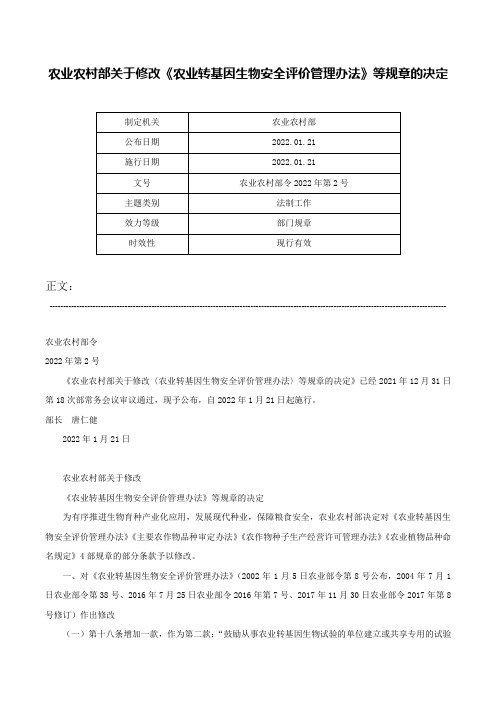
农业农村部关于修改《农业转基因生物安全评价管理办法》等规章的决定正文:----------------------------------------------------------------------------------------------------------------------------------------------------农业农村部令2022年第2号《农业农村部关于修改〈农业转基因生物安全评价管理办法〉等规章的决定》已经2021年12月31日第18次部常务会议审议通过,现予公布,自2022年1月21日起施行。
部长唐仁健2022年1月21日农业农村部关于修改《农业转基因生物安全评价管理办法》等规章的决定为有序推进生物育种产业化应用,发展现代种业,保障粮食安全,农业农村部决定对《农业转基因生物安全评价管理办法》《主要农作物品种审定办法》《农作物种子生产经营许可管理办法》《农业植物品种命名规定》4部规章的部分条款予以修改。
一、对《农业转基因生物安全评价管理办法》(2002年1月5日农业部令第8号公布,2004年7月1日农业部令第38号、2016年7月25日农业部令2016年第7号、2017年11月30日农业部令2017年第8号修订)作出修改(一)第十八条增加一款,作为第二款:“鼓励从事农业转基因生物试验的单位建立或共享专用的试验基地。
”(二)对附录Ⅰ作如下修改1.将“二、转基因植物试验方案”中的“品种、品系”修改为“转化体”。
2.将“三、转基因植物各阶段申报要求”3.2修改为:“试验转基因植物材料数量:一份申报书只能申请1个转化体,其名称应与前期试验阶段的名称或编号相对应。
”3.将“三、转基因植物各阶段申报要求”3.3中的“应在批准过环境释放的省(市、自治区)进行”修改为“应在试验植物的适宜生态区进行”。
4.删除“三、转基因植物各阶段申报要求”3.5.10。
5.将“三、转基因植物各阶段申报要求”4.1修改为:“项目名称:应包含目的基因名称、转基因植物名称等几个部分,如转cry1Ac基因抗虫棉花XY12的安全证书。
转基因食品法律法规
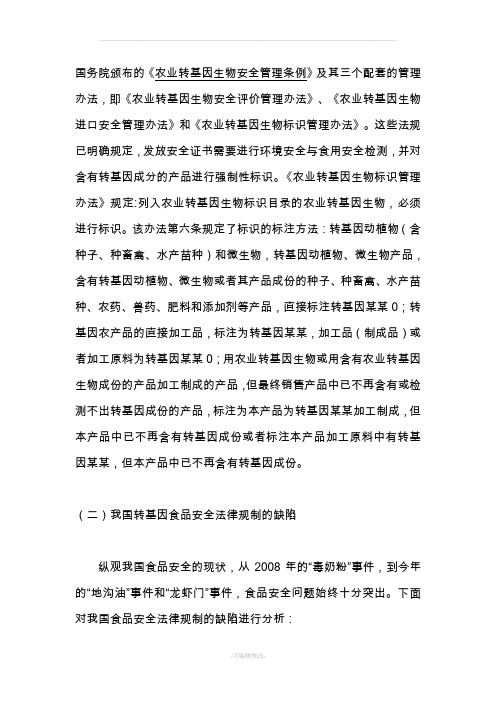
国务院颁布的《农业转基因生物安全管理条例》及其三个配套的管理办法,即《农业转基因生物安全评价管理办法》、《农业转基因生物进口安全管理办法》和《农业转基因生物标识管理办法》。
这些法规已明确规定,发放安全证书需要进行环境安全与食用安全检测,并对含有转基因成分的产品进行强制性标识。
《农业转基因生物标识管理办法》规定:列入农业转基因生物标识目录的农业转基因生物,必须进行标识。
该办法第六条规定了标识的标注方法:转基因动植物(含种子、种畜禽、水产苗种)和微生物,转基因动植物、微生物产品,含有转基因动植物、微生物或者其产品成份的种子、种畜禽、水产苗种、农药、兽药、肥料和添加剂等产品,直接标注转基因某某0;转基因农产品的直接加工品,标注为转基因某某,加工品(制成品)或者加工原料为转基因某某0;用农业转基因生物或用含有农业转基因生物成份的产品加工制成的产品,但最终销售产品中已不再含有或检测不出转基因成份的产品,标注为本产品为转基因某某加工制成,但本产品中已不再含有转基因成份或者标注本产品加工原料中有转基因某某,但本产品中已不再含有转基因成份。
(二)我国转基因食品安全法律规制的缺陷纵观我国食品安全的现状,从2008年的“毒奶粉”事件,到今年的“地沟油”事件和“龙虾门”事件,食品安全问题始终十分突出。
下面对我国食品安全法律规制的缺陷进行分析:1、现有立法层次不高。
国际上以美国、日本等为代表的很多国家都是针对转基因食品安全进行专门立法,而我国对于转基因生物技术颁布的多是行政法规和部门规章。
这些法规大多从本部门的职责角度出发,对转基因技术及其产品进行管理,具有临时性和应急性,难以从整个生物安全角度出发,对转基因生物技术及其产品安全的监督管理作出全面系统规定。
制定专门的转基因食品安全法我国的转基因食品安全立法与国外(如美国、欧盟、日本)的差距主要表现在我国缺乏转基因食品安全的专门立法。
虽然有关转基因食品安全的有关规定可散见于《农业转基因生物安全管理条例》等,但适用于转基因食品安全的一些特殊规定,如转基因食品的检测标准,就与转基因生物安全有所不同。
转基因生物加工安全管理制度 (2)

转基因生物加工安全管理制度第一章总则第一条为规范农业转基因生物加工活动,确保转基因生物在装卸、运输、储存以及加工过程中的封闭式管理,防范转基因生物对人类、动物、微生物和生态环境构成危险或潜在风险,根据农业部《转基因生物安全条例》、《农业转基因生物安全管理办法》、《农业转基因生物进口安全管理办法》,结合本公司实际情况,制定本制度。
第二条本办法所称农业转基因生物,是指用于农产品加工的转基因动植物、微生物及其产品,具体指进口转基因玉米。
第三条本办法所称农业转基因生物加工是指以具有活性的农业转基因生物为原料生产农业转基因产品的活动。
具体指以进口转基因原料,进行饲料加工等活动。
第二章组织保障第四条成立进口转基因生物安全管理小组。
为确保进口转基因玉米在原料采购、运输、贮藏、加工及产品销售等环节的安全性,明确相关部门及人员的职责,将各项工作落实到实处,公司特成立进口转基因玉米安全管理小组(以下简称“安全管理小组”),主要负责进口转基因玉米加工过程中的安全管理、日常监督及突发事件的应急指挥等工作。
第五条职责分工一、组长(总经理)(一)职责1.负责公司进口转基因玉米各环节安全工作的总体策划。
2.负责进口转基因玉米加工过程中及突发事件处理过程中相关资源(人力、物力、财力等)的配备工作。
3.负责转基因生物扩散突发事件的总指挥及突发事件后与上级主管部门之间的协调沟通工作。
4.对本公司采购加工的进口转基因玉米安全性负整体责任。
(二)权限1.有权调动公司内一切资源。
2.有权组织各相关单位定期或不定期召开进口转基因玉米相关安全工作会议。
3.有权变更安全管理小组中所有人员及其职责和权限。
4.有权对进口转基因玉米安全工作进行直接安排。
5.有权对出现问题的单位和人员进行直接处理。
二、副组长(副总经理)(一)职责1.配合组长做好公司进口转基因玉米各环节的相关安全性工作及技术指导。
2.负责贯彻落实国家关于转基因方面相关法律法规和政策。
农业转基因生物安全管理条例

农业转基因生物安全管理条例The Regulations on the Safety Management of Transgenic Organisms in Agriculture (hereinafter referred to as the Regulations) is formulated in accordance with the “Law of the People’s Republic of China on the Protection of the ecological environment” and the “Law of the People’s Republic of Chinaon the prevention and control of pollution from the production process of agricultural products”, in order to protect the ecological environment and ensure the safety of agricultural products.Article 1 These Regulations are applicable to the production, import and use of microbes, animals and plants with genetic transformation technology in the agricultural production process.Article 2 The safety management of transgenic organisms in agriculture shall be in accordance with this regulation.Article 3 The relevant departments of the state shouldstrengthen the supervision and inspection of transgenicorganisms in agricultural production and import, and enhance the safety assessment, safety control and safety management of transgenic organisms in agricultural production.Article 4 The competent departments of agricultural and animalhusbandry shall include the safety management of transgenic organisms in agricultural production into the regular inspection and supervision of agricultural production and animal husbandry, and strengthen the guidance, supervision and inspection of the production, planting and animal husbandry of transgenic organisms.Article 5 Enterprises engaged in the production, import and use of transgenic organisms in agricultural production shall, in accordance with the provisions of the Regulations, establish a safety management system, appoint a safety management personnel, accept the guidance and supervision of the relevant departments of the state, and strengthen the safety management of transgenic organisms in agricultural production.Article 6 Enterprises producing, importing and using transgenic organisms in agricultural production shall carry out safety risk assessment before the production, import and use of transgenic organisms, and the safety risk assessment report shall be reported to the relevant departments of the state for review.Article 7 Enterprises engaged in the production, import and use of transgenic organisms in agricultural production shall pass satisfactory safety risk assessment before they can be used.Article 8 Enterprises engaged in the production and import of transgenic organisms in agricultural production shall set up a safety management system and appoint a safety officer to be responsible for the safety management of transgenic organisms from the production, importation, distribution and sale to the end of use.Article 9 Enterprises engaged in the production, import and use of transgenic organisms in agricultural production shall implement safety management at the following stages:(1) The production stage: The enterprises should establish and improve the safety management system, improve production management measures, and strengthen employee training on safety awareness;(2) The import stage: Enterprises should strengthen the inspection and quarantine, and ensure the safety of transgenic organisms by conducting safety checks;(3) The use stage: Enterprises should strictly implement the standards and requirements for the use of transgenic organisms, and should not use transgenic organisms beyond the scope and purpose approved by the relevant departments of the state.Article 10 Enterprises engaged in the production, import and use of transgenic organisms in the agricultural production process shall strengthen the safety management of transgenic organismsin the use process and shall strictly implement the plans, standards and regulations for the safe use of transgenic organisms.Article 11 Enterprises engaged in the production, import and use of transgenic organisms in agricultural production shall strengthen the collection, record and management of relevant information. The relevant departments of the state should also strengthen the collection, analysis, research and use of such information.Article 12 Enterprises producing, importing and using transgenic organisms in the agricultural production process and theirillegal acts of production, import and use of transgenic organisms shall be punished by the relevant departments of the state in accordance with the relevant regulations.Article 13 Enterprises producing, importing and using transgenic organisms in the agricultural production process shall, if they cause damage to human life and property, be held liable in accordance with the law, and the legal liability of the personnel directly responsible shall be investigated inaccordance with the law.Article 14 Any unit or individual is encouraged to report and accuse the illegal acts of production, importation, sale and use of transgenic organisms which affect public safety, and the relevant departments of the state shall handle them in accordance with the law.Article 15 These Regulations shall become effective as of the date of promulgation.。
农业转基因生物安全管理制度

得利斯股字[2021]34号农业转基因生物加工平安管理制度XX得利斯农业科技股份XX2008-4-4农业转基因生物加工平安管理制度第一章总那么第一条为规X农业转基因生物加工活动,确保转基因生物在装卸、运输、储存以及加工过程中的封闭式管理,防X转基因生物对人类、动植物、微生物和生态环境构成危险或潜在风险,根据?农业转基因生物平安条例?、?农业转基因生物标识管理方法?、?农业转基因生物平安评价管理方法?、?农业转基因生物进口平安管理方法?,结合华农公司实际,特制定本制度。
第二条本方法所称农业转基因生物,是指用于农产品加工的具有活性的转基因动植物、微生物及其产品,具体指进口转基因大豆及其加工的产品〔包括豆油、豆粕、浓缩磷脂产品等〕。
第三条本方法所称农业转基因生物加工是指以具有活性的农业转基因生物为原料生产农业转基因产品的活动。
具体指以进口转基因大豆为原料,生产豆油、豆粕、浓缩磷脂产品的活动。
第二章组织保障第四条成立进口转基因大豆平安管理小组为确保进口转基因大豆在采购、运输、贮藏、加工及产品销售等环节的平安性,明确相关部门及人员的职责,将各项工作切实落到实处,公司特成立进口转基因大豆平安管理小组〔以下简称“平安管理小组〞〕,主要负责进口转基因大豆加工过程中的平安管理、日常监视检查及突发事件的应急指挥等工作。
组长:陈汉宗执行组长:卢德明执行副组长:王海波组员:王永强赵淑颖殷方玉X文学黄庆第五条职责分工〔一〕组长1、职责〔1〕负责公司进口转基因大豆各环节平安工作的总体筹划。
〔2〕负责进口转基因大豆加工过程中及突发事件处理过程中相关资源〔人力、物力,必要时财力等〕的配备工作。
〔3〕负责转基因生物扩散等突发事件的总指挥及突发事件后与上级主管部门之间的协调沟通工作。
〔4〕对本公司采购加工的进口转基因大豆平安性负整体责任。
2、权限〔1〕有权调动公司内一切资源。
〔2〕有权组织各部门定期或不定期召开进口转基因大豆相关平安工作会议。
中华人民共和国农业部公告(第190号)--正式实施《农业转基因生物安全评价管理办法》等三项办法
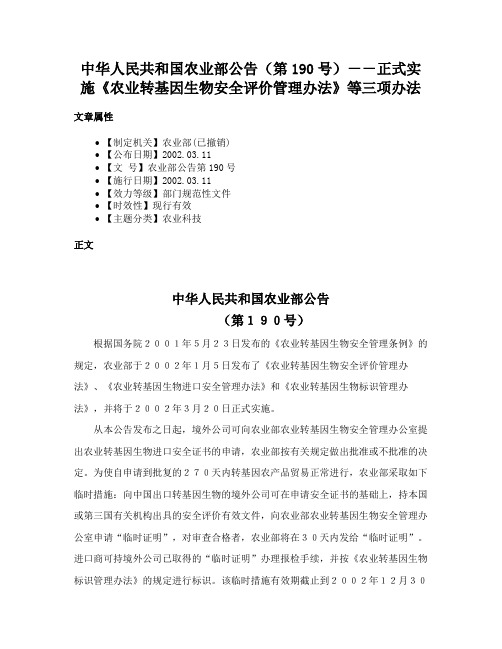
中华人民共和国农业部公告(第190号)--正式实施《农业转基因生物安全评价管理办法》等三项办法
文章属性
•【制定机关】农业部(已撤销)
•【公布日期】2002.03.11
•【文号】农业部公告第190号
•【施行日期】2002.03.11
•【效力等级】部门规范性文件
•【时效性】现行有效
•【主题分类】农业科技
正文
中华人民共和国农业部公告
(第190号)
根据国务院2001年5月23日发布的《农业转基因生物安全管理条例》的规定,农业部于2002年1月5日发布了《农业转基因生物安全评价管理办法》、《农业转基因生物进口安全管理办法》和《农业转基因生物标识管理办法》,并将于2002年3月20日正式实施。
从本公告发布之日起,境外公司可向农业部农业转基因生物安全管理办公室提出农业转基因生物进口安全证书的申请,农业部按有关规定做出批准或不批准的决定。
为使自申请到批复的270天内转基因农产品贸易正常进行,农业部采取如下临时措施:向中国出口转基因生物的境外公司可在申请安全证书的基础上,持本国或第三国有关机构出具的安全评价有效文件,向农业部农业转基因生物安全管理办公室申请“临时证明”,对审查合格者,农业部将在30天内发给“临时证明”。
进口商可持境外公司已取得的“临时证明”办理报检手续,并按《农业转基因生物标识管理办法》的规定进行标识。
该临时措施有效期截止到2002年12月30
日。
特此公告。
中华人民共和国农业部
2002年3月11日。
农业转基因生物安全管理条例(2017年修订)

农业转基因生物安全管理条例(2017年修订)文章属性•【制定机关】国务院•【公布日期】2017.10.07•【文号】•【施行日期】2017.10.07•【效力等级】行政法规•【时效性】现行有效•【主题分类】农业科技正文农业转基因生物安全管理条例(2001年5月23日中华人民共和国国务院令第304号公布根据2011年1月8日《国务院关于废止和修改部分行政法规的决定》第一次修订根据2017年10月7日《国务院关于修改部分行政法规的决定》第二次修订)第一章总则第一条为了加强农业转基因生物安全管理,保障人体健康和动植物、微生物安全,保护生态环境,促进农业转基因生物技术研究,制定本条例。
第二条在中华人民共和国境内从事农业转基因生物的研究、试验、生产、加工、经营和进口、出口活动,必须遵守本条例。
第三条本条例所称农业转基因生物,是指利用基因工程技术改变基因组构成,用于农业生产或者农产品加工的动植物、微生物及其产品,主要包括:(一)转基因动植物(含种子、种畜禽、水产苗种)和微生物;(二)转基因动植物、微生物产品;(三)转基因农产品的直接加工品;(四)含有转基因动植物、微生物或者其产品成份的种子、种畜禽、水产苗种、农药、兽药、肥料和添加剂等产品。
本条例所称农业转基因生物安全,是指防范农业转基因生物对人类、动植物、微生物和生态环境构成的危险或者潜在风险。
第四条国务院农业行政主管部门负责全国农业转基因生物安全的监督管理工作。
县级以上地方各级人民政府农业行政主管部门负责本行政区域内的农业转基因生物安全的监督管理工作。
县级以上各级人民政府有关部门依照《中华人民共和国食品安全法》的有关规定,负责转基因食品安全的监督管理工作。
第五条国务院建立农业转基因生物安全管理部际联席会议制度。
农业转基因生物安全管理部际联席会议由农业、科技、环境保护、卫生、外经贸、检验检疫等有关部门的负责人组成,负责研究、协调农业转基因生物安全管理工作中的重大问题。
国务院法制办公室对农业部《关于商请对<农业转基因生物安全管理条例>有关问题进行解释的函》的答复

国务院法制办公室对农业部《关于商请对<农业转基因生物安全管理条例>有关问题进行解释的函》的答复文章属性•【制定机关】国务院法制办公室(已撤销)•【公布日期】2002.03.04•【文号】国法函[2002]19号•【施行日期】2002.03.04•【效力等级】行政法规解释•【时效性】现行有效•【主题分类】农业科技正文国务院法制办公室对农业部《关于商请对<农业转基因生物安全管理条例>有关问题进行解释的函》的答复(2002年3月4日国法函[2002]19号)农业部:你部《关于商请对<农业转基因生物安全管理条例>有关问题进行解释的函》(农政函[2002]4号)收悉。
经研究并征求有关部门意见,现答复,如下:一、关于“直接加工品”的范围《农业转基因生物安全管理条例》(以下简称《条例》)第三条第一款第(三)项规定的“转基因农产品的直接加工品”是指转基因农产品直接加工所得的产品,包括大豆粉、大豆油、豆粕、玉米粉、玉米油、油菜籽油、油菜籽粕、番茄酱等。
二、关于第三十四条规定的农业转基因生物的范围《条例》第三十四条规定的需要取得农业转基因生物安全证书的农业转基因生物的范围,是指《条例》第三条规定的农业转基因生物。
附:对外贸易经济合作部关于对《农产品转基因生物安全管理条例》解释意见的函(2002年2月25日外经贸法函[2002]16号)国务院法制办:你办关于就农业部提出的《关于商请对<农业转基因生物安全管理条例>有关问题进行解释的函》征求我部意见的函收悉。
经研究,我部对农业部关于《条例》第三条第(三)项和第三十四条的解释无不同意见。
关于农产品转基因生物安全的管理有关问题,我部根据所了解的情况提出如下意见供参考:一、在我与美方的会谈中,美方一直认为我方缺乏技术力量实施条例的规定,至少无法实施对大豆油转基因成分的检测,因此最终将无法实施条例的规定。
我部认为,我国法规可以将大豆油列入管理的范围,但应当做好应对美方交涉的准备工作。
农业转基因生物安全分级管理
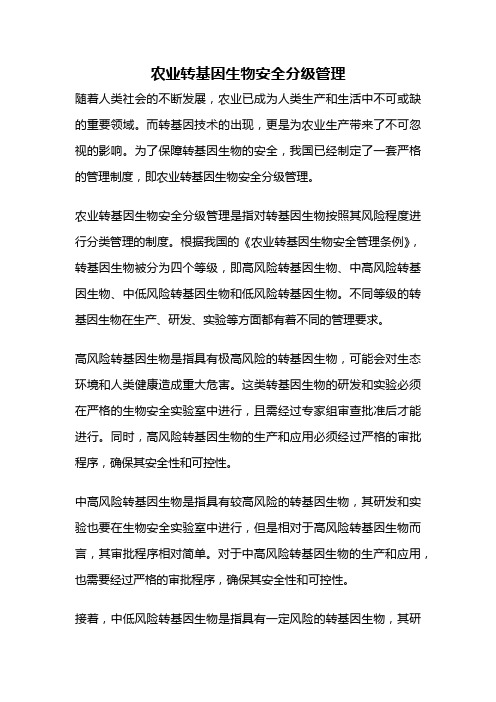
农业转基因生物安全分级管理随着人类社会的不断发展,农业已成为人类生产和生活中不可或缺的重要领域。
而转基因技术的出现,更是为农业生产带来了不可忽视的影响。
为了保障转基因生物的安全,我国已经制定了一套严格的管理制度,即农业转基因生物安全分级管理。
农业转基因生物安全分级管理是指对转基因生物按照其风险程度进行分类管理的制度。
根据我国的《农业转基因生物安全管理条例》,转基因生物被分为四个等级,即高风险转基因生物、中高风险转基因生物、中低风险转基因生物和低风险转基因生物。
不同等级的转基因生物在生产、研发、实验等方面都有着不同的管理要求。
高风险转基因生物是指具有极高风险的转基因生物,可能会对生态环境和人类健康造成重大危害。
这类转基因生物的研发和实验必须在严格的生物安全实验室中进行,且需经过专家组审查批准后才能进行。
同时,高风险转基因生物的生产和应用必须经过严格的审批程序,确保其安全性和可控性。
中高风险转基因生物是指具有较高风险的转基因生物,其研发和实验也要在生物安全实验室中进行,但是相对于高风险转基因生物而言,其审批程序相对简单。
对于中高风险转基因生物的生产和应用,也需要经过严格的审批程序,确保其安全性和可控性。
接着,中低风险转基因生物是指具有一定风险的转基因生物,其研发和实验可以在普通实验室中进行,但是需要遵守相关的安全规范和要求。
对于中低风险转基因生物的生产和应用,也需要经过审批程序,确保其安全性和可控性。
低风险转基因生物是指具有较低风险的转基因生物,其研发和实验可以在普通实验室中进行,但是也需要遵守相关的安全规范和要求。
对于低风险转基因生物的生产和应用,只需要进行备案登记即可。
在农业转基因生物安全分级管理中,除了对不同等级的转基因生物进行分类管理外,还有着相关的监管机制和责任制度。
相关部门和企业需要对转基因生物的安全性进行严格把关,确保其不会对生态环境和人类健康造成危害。
同时,对于违反相关法规的行为,也将会受到相应的法律制裁。
转基因食品法律法规

国务院颁布的《农业转基因生物安全管理条例》及其三个配套的管理办法,即《农业转基因生物安全评价管理办法》、《农业转基因生物进口安全管理办法》和《农业转基因生物标识管理办法》。
这些法规已明确规定,发放安全证书需要进行环境安全与食用安全检测,并对含有转基因成分的产品进行强制性标识。
《农业转基因生物标识管理办法》规定:列入农业转基因生物标识目录的农业转基因生物,必须进行标识。
该办法第六条规定了标识的标注方法:转基因动植物(含种子、种畜禽、水产苗种)和微生物,转基因动植物、微生物产品,含有转基因动植物、微生物或者其产品成份的种子、种畜禽、水产苗种、农药、兽药、肥料和添加剂等产品,直接标注转基因某某0;转基因农产品的直接加工品,标注为转基因某某,加工品(制成品)或者加工原料为转基因某某0;用农业转基因生物或用含有农业转基因生物成份的产品加工制成的产品,但最终销售产品中已不再含有或检测不出转基因成份的产品,标注为本产品为转基因某某加工制成,但本产品中已不再含有转基因成份或者标注本产品加工原料中有转基因某某,但本产品中已不再含有转基因成份。
(二)我国转基因食品安全法律规制的缺陷纵观我国食品安全的现状,从2008年的“毒奶粉”事件,到今年的“地沟油"事件和“龙虾门”事件,食品安全问题始终十分突出.下面对我国食品安全法律规制的缺陷进行分析:1、现有立法层次不高.国际上以美国、日本等为代表的很多国家都是针对转基因食品安全进行专门立法,而我国对于转基因生物技术颁布的多是行政法规和部门规章。
这些法规大多从本部门的职责角度出发,对转基因技术及其产品进行管理,具有临时性和应急性,难以从整个生物安全角度出发,对转基因生物技术及其产品安全的监督管理作出全面系统规定。
制定专门的转基因食品安全法我国的转基因食品安全立法与国外(如美国、欧盟、日本)的差距主要表现在我国缺乏转基因食品安全的专门立法.虽然有关转基因食品安全的有关规定可散见于《农业转基因生物安全管理条例》等,但适用于转基因食品安全的一些特殊规定,如转基因食品的检测标准,就与转基因生物安全有所不同。
中华人民共和国农业转基因生物安全管理条例(2017年修正本)
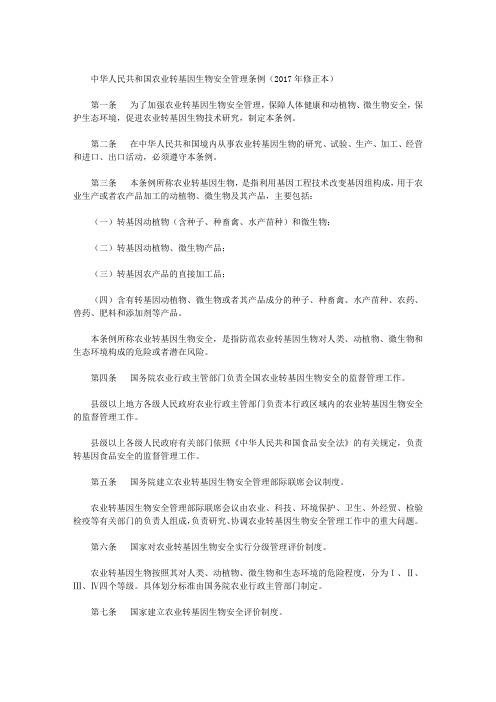
中华人民共和国农业转基因生物安全管理条例(2017年修正本)第一条为了加强农业转基因生物安全管理,保障人体健康和动植物、微生物安全,保护生态环境,促进农业转基因生物技术研究,制定本条例。
第二条在中华人民共和国境内从事农业转基因生物的研究、试验、生产、加工、经营和进口、出口活动,必须遵守本条例。
第三条本条例所称农业转基因生物,是指利用基因工程技术改变基因组构成,用于农业生产或者农产品加工的动植物、微生物及其产品,主要包括:(一)转基因动植物(含种子、种畜禽、水产苗种)和微生物;(二)转基因动植物、微生物产品;(三)转基因农产品的直接加工品;(四)含有转基因动植物、微生物或者其产品成分的种子、种畜禽、水产苗种、农药、兽药、肥料和添加剂等产品。
本条例所称农业转基因生物安全,是指防范农业转基因生物对人类、动植物、微生物和生态环境构成的危险或者潜在风险。
第四条国务院农业行政主管部门负责全国农业转基因生物安全的监督管理工作。
县级以上地方各级人民政府农业行政主管部门负责本行政区域内的农业转基因生物安全的监督管理工作。
县级以上各级人民政府有关部门依照《中华人民共和国食品安全法》的有关规定,负责转基因食品安全的监督管理工作。
第五条国务院建立农业转基因生物安全管理部际联席会议制度。
农业转基因生物安全管理部际联席会议由农业、科技、环境保护、卫生、外经贸、检验检疫等有关部门的负责人组成,负责研究、协调农业转基因生物安全管理工作中的重大问题。
第六条国家对农业转基因生物安全实行分级管理评价制度。
农业转基因生物按照其对人类、动植物、微生物和生态环境的危险程度,分为I、Ⅱ、Ⅲ、Ⅳ四个等级。
具体划分标准由国务院农业行政主管部门制定。
第七条国家建立农业转基因生物安全评价制度。
农业转基因生物安全评价的标准和技术规范,由国务院农业行政主管部门制定。
第八条国家对农业转基因生物实行标识制度。
实施标识管理的农业转基因生物目录,由国务院农业行政主管部门商国务院有关部门制定、调整并公布。
农业转基因生物安全管理条例(修正版)
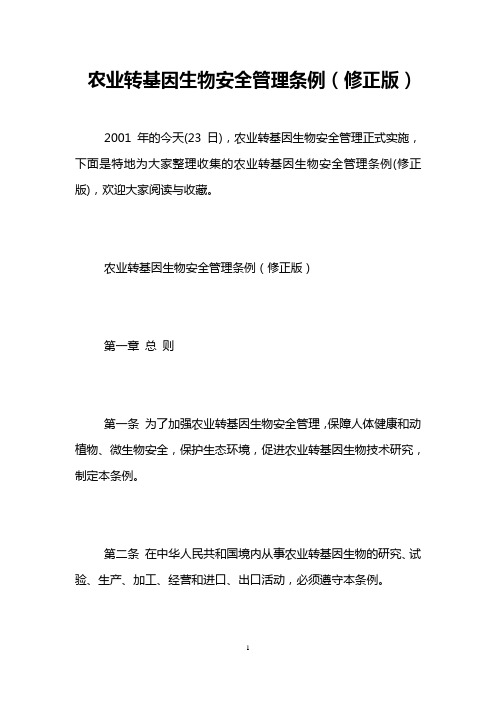
农业转基因生物安全管理条例(修正版)2001年的今天(23日),农业转基因生物安全管理正式实施,下面是特地为大家整理收集的农业转基因生物安全管理条例(修正版),欢迎大家阅读与收藏。
农业转基因生物安全管理条例(修正版)第一章总则第一条为了加强农业转基因生物安全管理,保障人体健康和动植物、微生物安全,保护生态环境,促进农业转基因生物技术研究,制定本条例。
第二条在中华人民共和国境内从事农业转基因生物的研究、试验、生产、加工、经营和进口、出口活动,必须遵守本条例。
第三条本条例所称农业转基因生物,是指利用基因工程技术改变基因组构成,用于农业生产或者农产品加工的动植物、微生物及其产品,主要包括:(一)转基因动植物(含种子、种畜禽、水产苗种)和微生物;(二)转基因动植物、微生物产品;(三)转基因农产品的直接加工品;(四)含有转基因动植物、微生物或者其产品成份的种子、种畜禽、水产苗种、农药、兽药、肥料和添加剂等产品。
本条例所称农业转基因生物安全,是指防范农业转基因生物对人类、动植物、微生物和生态环境构成的危险或者潜在风险。
第四条国务院农业行政主管部门负责全国农业转基因生物安全的监督管理工作。
县级以上地方各级人民政府农业行政主管部门负责本行政区域内的农业转基因生物安全的监督管理工作。
县级以上各级人民政府有关部门依照《中华人民共和国食品安全法》的有关,负责转基因食品安全的监督管理工作。
第五条国务院建立农业转基因生物安全管理部际联席会议。
农业转基因生物安全管理部际联席会议由农业、科技、环境保护、卫生、外经贸、检验检疫等有关部门的负责人组成,负责研究、协调农业转基因生物安全管理工作中的重大问题。
第六条国家对农业转基因生物安全实行分级管理评价制度。
农业转基因生物按照其对人类、动植物、微生物和生态环境的危险程度,分为Ⅰ、Ⅱ、Ⅲ、Ⅳ四个等级。
具体划分标准由国务院农业行政主管部门制定。
第七条国家建立农业转基因生物安全评价制度。
- 1、下载文档前请自行甄别文档内容的完整性,平台不提供额外的编辑、内容补充、找答案等附加服务。
- 2、"仅部分预览"的文档,不可在线预览部分如存在完整性等问题,可反馈申请退款(可完整预览的文档不适用该条件!)。
- 3、如文档侵犯您的权益,请联系客服反馈,我们会尽快为您处理(人工客服工作时间:9:00-18:30)。
农业转基因生物安全管理条例
【法规类别】农业科技与农机
【发文字号】中华人民共和国国务院令第304号
【修改依据】国务院关于废止和修改部分行政法规的决定
【法宝提示】国务院关于第四批取消和调整行政审批项目的决定国务院关于第五批取消和下放管理层级行政审批项目的决定国务院关于取消和调整一批行政审批项目等事项的决定(国发[2014]50号)
【发布部门】国务院
【发布日期】2001.05.23
【实施日期】2001.05.23
【时效性】已被修改
【效力级别】行政法规
中华人民共和国国务院令
(第304号)
《农业转基因生物安全管理条例》已经2001年5月9日国务院第38次常务会议通过,现予公布,自公布之日起施行。
总理朱镕基
二00一年五月二十三日
农业转基因生物安全管理条例
第一章总则
第一条为了加强农业转基因生物安全管理,保障人体健康和动植物、微生物安全,保护生态环境,促进农业转基因生物技术研究,制定本条例。
第二条在中华人民共和国境内从事农业转基因生物的研究、试验、生产、加工、经营和进口、出口活动,必须遵守本条例。
第三条本条例所称农业转基因生物,是指利用基因工程技术改变基因组构成,用于农业生产或者农产品加工的动植物、微生物及其产品,主要包括:
(一)转基因动植物(含种子、种畜禽、水产苗种)和微生物;
(二)转基因动植物、微生物产品;
(三)转基因农产品的直接加工品;
(四)含有转基因动植物、微生物或者其产品成份的种子、种畜禽、水产苗种、农药、兽药、肥料和添加剂等产品。
本条例所称农业转基因生物安全,是指防范农业转基因生物对人类、动植物、微生物和生态环境构成的危险或者潜在风险。
第四条国务院农业行政主管部门负责全国农业转基因生物安全的监督管理工作。
县级以上地方各级人民政府农业行政主管部门负责本行政区域内的农业转基因生物安全的监督管理工作。
县级以上各级人民政府卫生行政主管部门依照《中华人民共和国食品卫生法
》的有关规定,负责转基因食品卫生安全的监督管理工作。
第五条国务院建立农业转基因生物安全管理部际联席会议制度。
农业转基因生物安全管理部际联席会议由农业、科技、环境保护、卫生、外经贸、检验检疫等有关部门的负责人组成,负责研究、协调农业转基因生物安全管理工作中的重大问题。
第六条国家对农业转基因生物安全实行分级管理评价制度。
农业转基因生物按照其对人类、动植物、微生物和生态环境的危险程度,分为I、Ⅱ、Ⅲ、Ⅳ四个等级。
具体划分标准由国务院农业行政主管部门制定。
第七条国家建立农业转基因生物安全评价制度。
农业转基因生物安全评价的标准和技术规范,由国务院农业行政主管部门制定。
第八条国家对农业转基因生物实行标识制度。
实施标识管理的农业转基因生物目录,由国务院农业行政主管部门商国务院有关部门制定、调整并公布。
第二章研究与试验
第九条国务院农业行政主管部门应当加强农业转基因生物研究与试验的安全评价管理工作,并设立农业转基因生物安全委员会,负责农业转基因生物的安全评价工作。
农业转基因生物安全委员会由从事农业转基因生物研究、生产、加工、检验检疫以及卫生、环境保护等方面的专家组成。
第十条国务院农业行政主管部门根据农业转基因生物安全评价工作的需要,可以委托具备检测条件和能力的技术检测机构对农业转基因生物进行检测。
第十一条从事农业转基因生物研究与试验的单位,应当具备与安全等级相适应的安全设施和措施,确保农业转基因生物研究与试验的安全,并成立农业转基因生物安全小组,负责本单位农业转基因生物研究与试验的安全工作。
第十二条从事Ⅲ、Ⅳ级农业转基因生物研究的,应当在研究开始前向国务院农业行政主管部门报告。
第十三条农业转基因生物试验,一般应当经过中间试验、环境释放和生产性试验三个阶段。
中间试验,是指在控制系统内或者控制条件下进行的小规模试验。
环境释放,是指在自然条件下采取相应安全措施所进行的中规模的试验。
生产性试验,是指在生产和应用前进行的较大规模的试验。
第十四条农业转基因生物在实验室研究结束后,需要转入中间试验的,试验单位应当向国务院农业行政主管部门报告。
第十五条农业转基因生物试验需要从上一试验阶段转入下一试验阶段的,试验单位应当向国务院农业行政主管部门提出申请;经农业转基因生物安全委员会进行安全评价合格的,由国务院农业行政主管部门批准转入下一试验阶段。
试验单位提出前款申请,应当提供下列材料:
(一)农业转基因生物的安全等级和确定安全等级的依据;
(二)农业转基因生物技术检测机构出具的检测报告;
(三)相应的安全管理、防范措施;
(四)上一试验阶段的试验报告。
